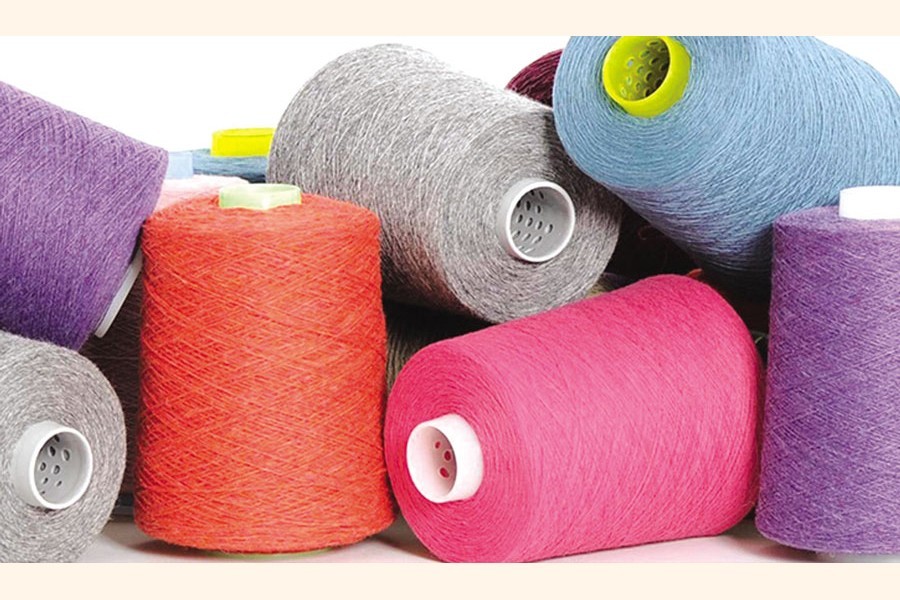Spree for seizing oncoming apparel demand
Cotton-yarn import up despite land-port ban
Local spinners, RMG minnows lose out while 40pc value addition is deemed difficult

Published :
Updated :

Bangladesh's clothing industries saw a surge in cotton-yarn import, even after the government imposed in April a ban on its shipment through land ports, as apparel makers eye oncoming export-demand rise.
The restrictions were aimed at curbing revenue losses caused by alleged miss-declaration by importers, which, however, could do little to stem the tide of cotton-made yarn from nearby amid the spree of preparation by factory owners to grab impending demand from western markets, sources said.
According to the latest customs data, total yarn imports rose 18 per cent to 207,955 tonnes during a three-month period between May and July, after the ban, compared to 176,925 tonnes in the same period of 2024.
In terms of value, imports grew 16 per cent to Tk 75.22 billion, up from Tk 64.85 billion in the same period a year before.
The increase was almost entirely driven by cotton yarn, which saw strong growth in both volume and value. Imports of cotton yarn jumped to 184,689 tonnes, up from 155,580 tonnes during the same three-month period last year.
In monetary terms, cotton -yarn imports surged to Tk 60.15 billion compared to Tk 50.63 billion in 2024. Monthly data show a consistent uptrend month on month, with 49,602 tonnes in May, 58,211 tonnes in June, and 67,462 tonnes in July 2025.
Industry-insiders attribute this surge to strong demand from the readymade-garment sector which has been building up inventories ahead of the peak production season for year-end export orders. A leading ready-made garment (RMG)-factory owner says the spike in cotton-yarn imports reflects pent-up demand as manufacturers prepare for increased export orders in the months ahead as tariff turmoil on the US market settles.
However, synthetic-yarn imports came under pressure during this period amid uncertainty over US tariffs, as synthetic apparel faces higher duties than cotton-based apparel while entering the US market. While cotton-yarn imports surged, synthetic-yarn categories recorded notable declines, especially in quantity. Imports of synthetic-filament yarn dropped to 84,041 tonnes from 96,858 tonnes last year.
However, the import value inched up to Tk 36.70 billion from Tk 35.13 billion, reflecting higher global prices. Synthetic staple-fibre yarn saw a steeper fall, with volumes plunging to 34,091 tonnes from 46,156 tonnes a year ago. Import value slid to Tk 20.81billion, down from Tk 23.04 billion.
Industry players have said the April land-port ban disrupted long-established supply chains, forcing importers to rely on costlier sea shipments with longer lead times.
President of BKMEA Mohammad Hatem told The Financial Express that the policy shift raised logistics costs and "hit smaller factories hardest, as they lack the financial strength to absorb the additional burden".
Shams Mahmud, managing director of Shasha Denims Ltd, says Indian-yarn imports through land ports had previously allowed partial shipments, helping importers manage bank liabilities more efficiently. Partial shipments also helped address quality issues more easily as problematic consignments could be handled separately. He also says synthetic-yarn-based apparel faces higher US tariffs compared to cotton-made apparel, discouraging importers amid uncertainty over reciprocal tariff rates in the US.
The land-port ban was introduced to curb alleged malpractices in yarn imports. A leading spinning miller, requesting anonymity, said the government banned yarn imports through land ports to prevent certain malpractices and safeguard revenue.
"The surge in cotton-yarn import after the ban shows that the allegations were indeed valid," he added.
President of BTMA Aziz Russell deplores that Bangladeshi spinners face unequal competition, especially from India.
"We are not against yarn imports from India or other countries," he says. "But Indian spinners enjoy up to 30-percent government incentives for export to Bangladesh. Their local market prices are higher than their export prices, which clearly indicates heavy subsidies."
Russell warns that unless the government takes timely policy action, the situation could become disastrous for the country's largest export-earning sector.
He also alerts all to a looming compliance issue: using imported yarn will make it difficult for the industry to meet the 40-percent local value addition, which is mandated by both the US government and under GSP Plus rules for exports to the European Union and the United States.
newsmanjasi@gmail.com


 For all latest news, follow The Financial Express Google News channel.
For all latest news, follow The Financial Express Google News channel.